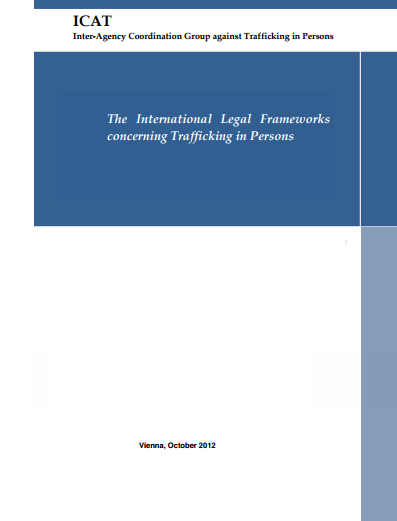The Inter-Agency Coordination Group against Trafficking in Persons (ICAT) was set up in 2007 in response to a United Nations Economic and Social Council (ECOSOC) resolution in 2006 (2006/27) requesting intergovernmental agencies to work together to strengthen technical assistance provided to countries in the area of human trafficking. A resolution of the UN General Assembly in March 2007 confirmed the importance of eliminating “gaps and overlaps” in the anti-trafficking efforts of intergovernmental agencies and requested the UN Secretary-General to develop interagency coordination further in order “to enhance cooperation and coordination and facilitate a holistic and comprehensive approach by the international community to the problem of trafficking in persons” (A/RES/61/180). As a policy forum, ICAT aims to facilitate a holistic and comprehensive approach by the international community to preventing and combating trafficking in persons including protection and support of victims of trafficking.
In response to this mandate, ICAT is committed to publishing a series of five issue papers, each examining one key issue that has been identified and agreed by ICAT’s member organisations as a critical challenge to address for the international community to succeed in the fight against trafficking in persons in the coming decade. The planned series of ICAT papers provides an opportunity for international organizations to speak with one voice and is intended to serve as a catalyst for the promotion of common strategic priorities and greater policy and programmatic coherence.
An overview paper titled, The next decade: Promoting common priorities and greater coherence in the fight against human trafficking, covering the summary of the five themes was launched in May 2012 in New York at an event hosted by ICAT and cosponsored by the Mission of Sweden together with the Association of South East Asian Nations (ASEAN). This publication is first issue paper of the series, titled the International Legal Frameworks concerning Trafficking in Persons.
The second issue paper, titled Preventing trafficking in persons by addressing demand, is the result of inter-agency teamwork benefiting from the extensive experience of the members of the ICAT Working Group, comprising ILO, IOM, OHCHR, UNHCR, UNICEF and UNODC, coming together to contribute in a collegial manner their experiences and institutional expertise in the advancement of a common cause – to enhance coherence in addressing the issue of human trafficking.

